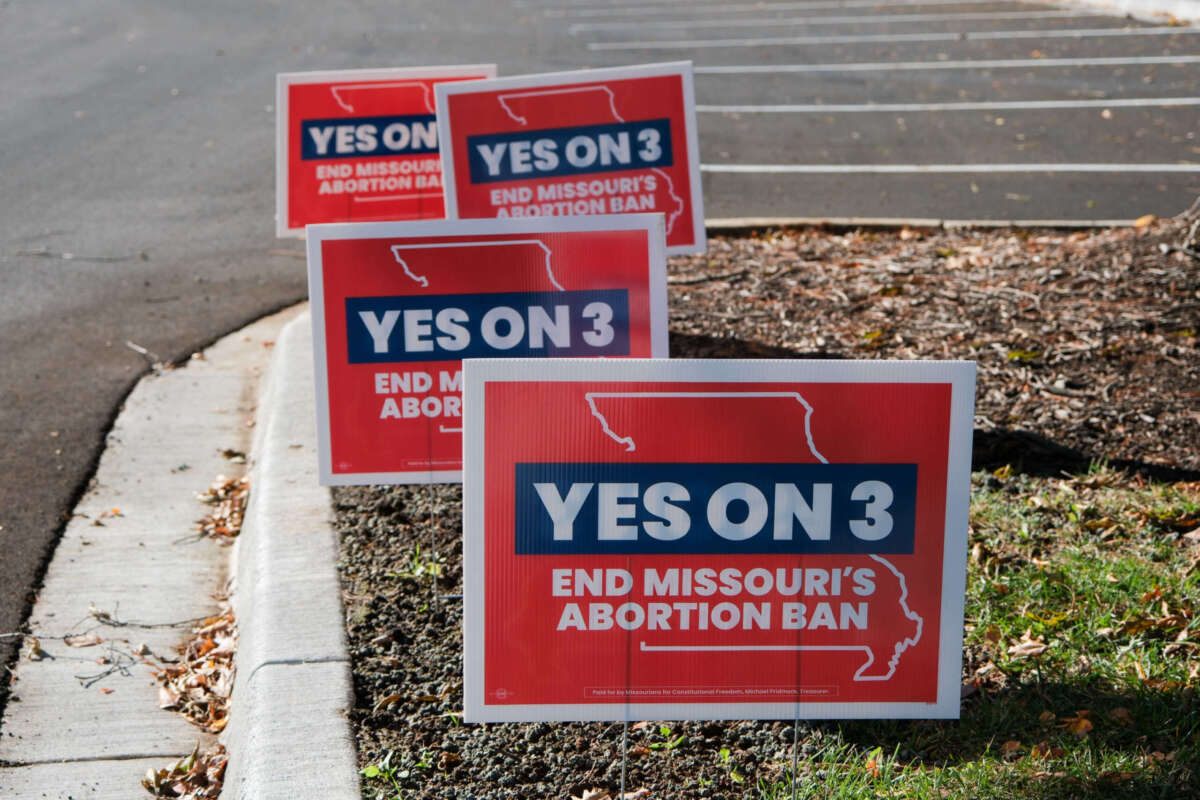Honest, paywall-free news is rare. Please support our boldly independent journalism with a donation of any size.
On Election Day, voters made Missouri the first state with a total abortion ban after Roe v. Wade to pass a constitutional amendment recognizing abortion as a fundamental right — but right-wing lawmakers now appear to be exploring ways to override the will of the people.
“Anti-abortion, anti-democracy politicians are going to try to stomp us out,” Mallory Schwarz, executive director with Abortion Action Missouri, told a crowd when the passage of the abortion rights amendment was announced.
Missouri was one of seven states that passed abortion rights measures on Election Day last week. By voting yes on Amendment 3, Missouri voters successfully overturned one of the nation’s strictest abortion bans, which had prohibited abortion entirely without exceptions for cases of rape or incest. Amendment 3 — which passed nearly 52 to 48 percent — establishes and safeguards the fundamental right to reproductive freedom in the state’s constitution. In 30 days, when the amendment takes effect, abortion will become legal up to the point of fetal viability, which is generally defined as the stage when a fetus can survive outside the womb, according to the American College of Obstetricians and Gynecologists.
Despite the passage of the abortion rights amendment, however, the state’s abortion ban has not yet been repealed. To ensure state compliance with the amendment, Missouri’s two Planned Parenthood providers filed a lawsuit within 24 hours of Missouri voters approving the amendment.
“The state’s people get to vote on their constitutional right, and from there, we go to court to say, ‘Here’s where we think the conflicts exist. These are the barriers, the hurdles that prevent people from exercising their newly established constitutional right,’” said Emily Wales, president and CEO of Comprehensive Health of Planned Parenthood Great Plains.
The suit asks a judge to block several long-standing abortion restrictions, including the requirement that physicians have hospital admitting privileges, a mandatory 72-hour waiting period before an abortion, and criminal penalties for abortion providers.
“Missourians have spoken and we’re ready to deliver,” Wales said. “There are many restrictions to challenge before access can be fully realized, but we’re proud to continue this fight to make sure everyone in this state can have the safe, legal abortion care they deserve. And soon, when Missourians ask where they can get care, we’ll have a simple answer: right here at home.”
While Missouri House Majority Leader Jonathan Patterson (R) has urged lawmakers to respect the will of voters in passing Amendment 3, Rep. Justin Sparks (R), who is competing with Patterson for the speakership, would like to limit or even overturn the abortion rights amendment.
“That’s not what the leader of the Republican caucus should be saying, guys,” Sparks said in a video announcing his bid for the speakership and addressing Patterson’s call to respect voters’ support of the abortion rights amendment. “On day one, your speaker must address and tackle Amendment 3.”
Sparks is notoriously anti-abortion and has introduced several anti-abortion bills during his time in the legislature. One bill would have prevented Missouri medical students from obtaining “abortion-specific training” in other states, while another sought to ban the use of fetal tissue or organs from elective abortions for research. He has also proposed a second constitutional amendment asking Missourians whether they supported granting personhood to embryos and fetuses.
“We know anti-democratic lawmakers are eager to ignore the will of the voters, but I can assure you we’re not letting our foot off the gas now,” Anamarie Rebori Simmons, chief of staff of Planned Parenthood Great Plains, said on X last week.
This challenge to Patterson’s leadership could serve as an early test of how far Republican lawmakers are willing to go to attempt to overhaul voters’ support of abortion rights in the state. Missouri lawmakers are set to officially choose the speaker at the beginning of the next legislative session.
Media that fights fascism
Truthout is funded almost entirely by readers — that’s why we can speak truth to power and cut against the mainstream narrative. But independent journalists at Truthout face mounting political repression under Trump.
We rely on your support to survive McCarthyist censorship. Please make a tax-deductible one-time or monthly donation.
